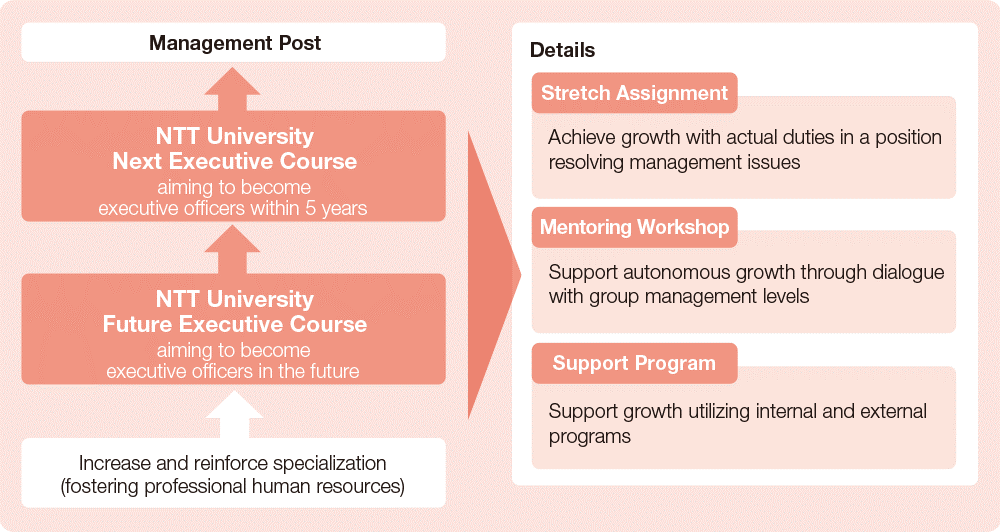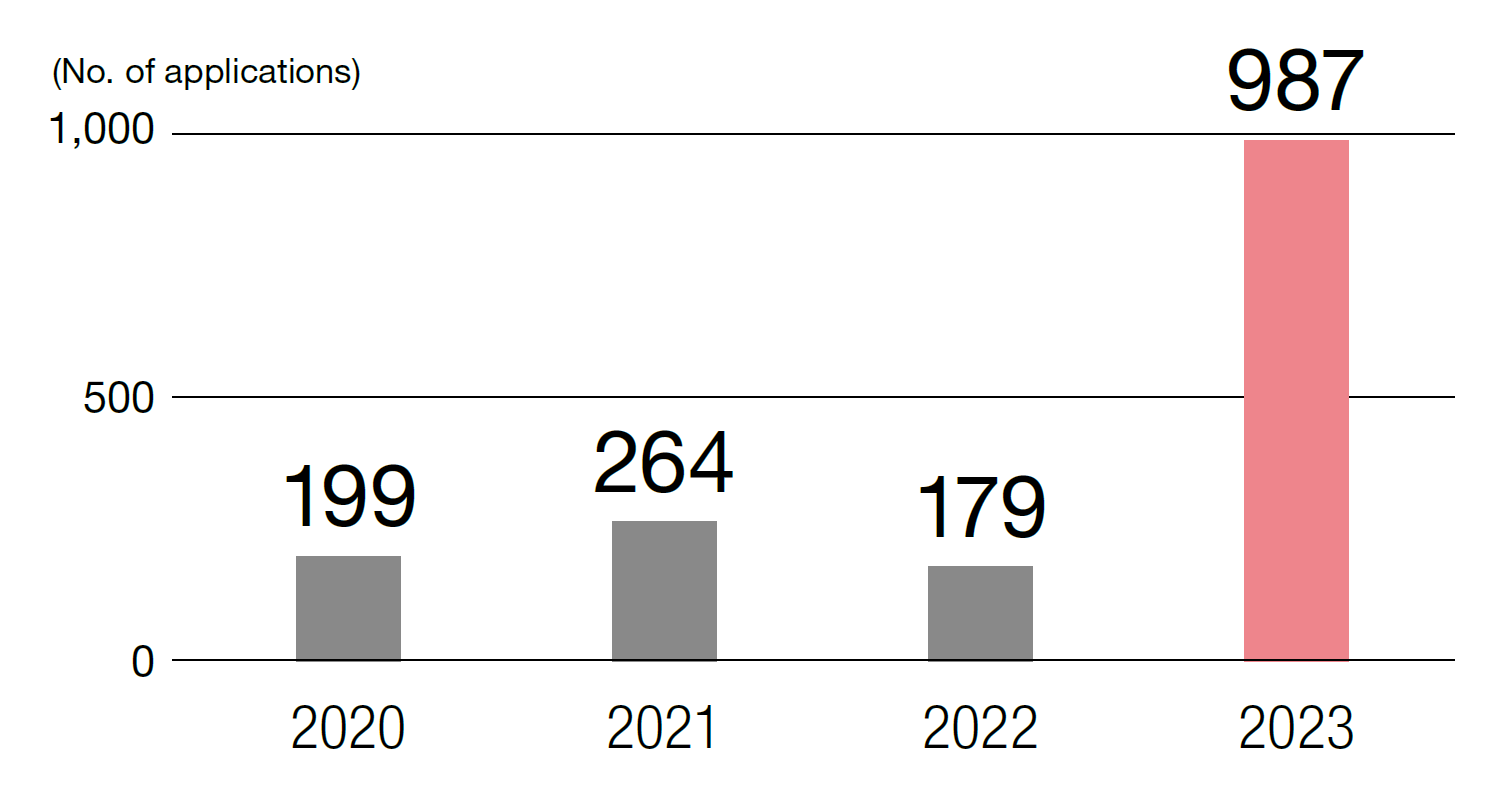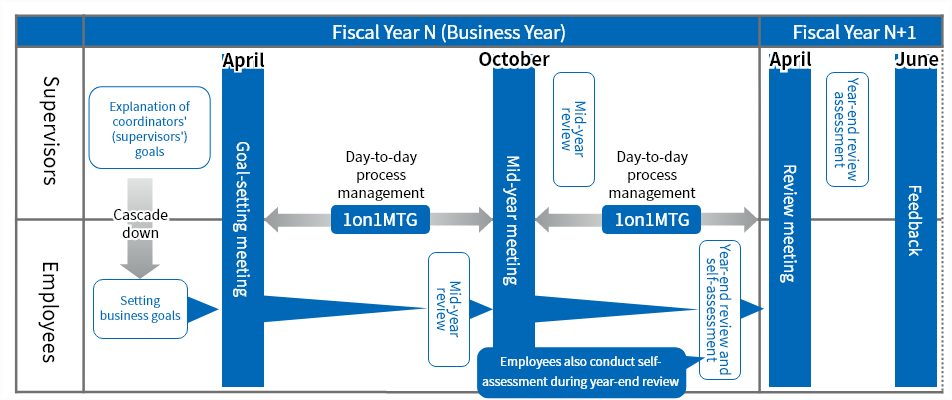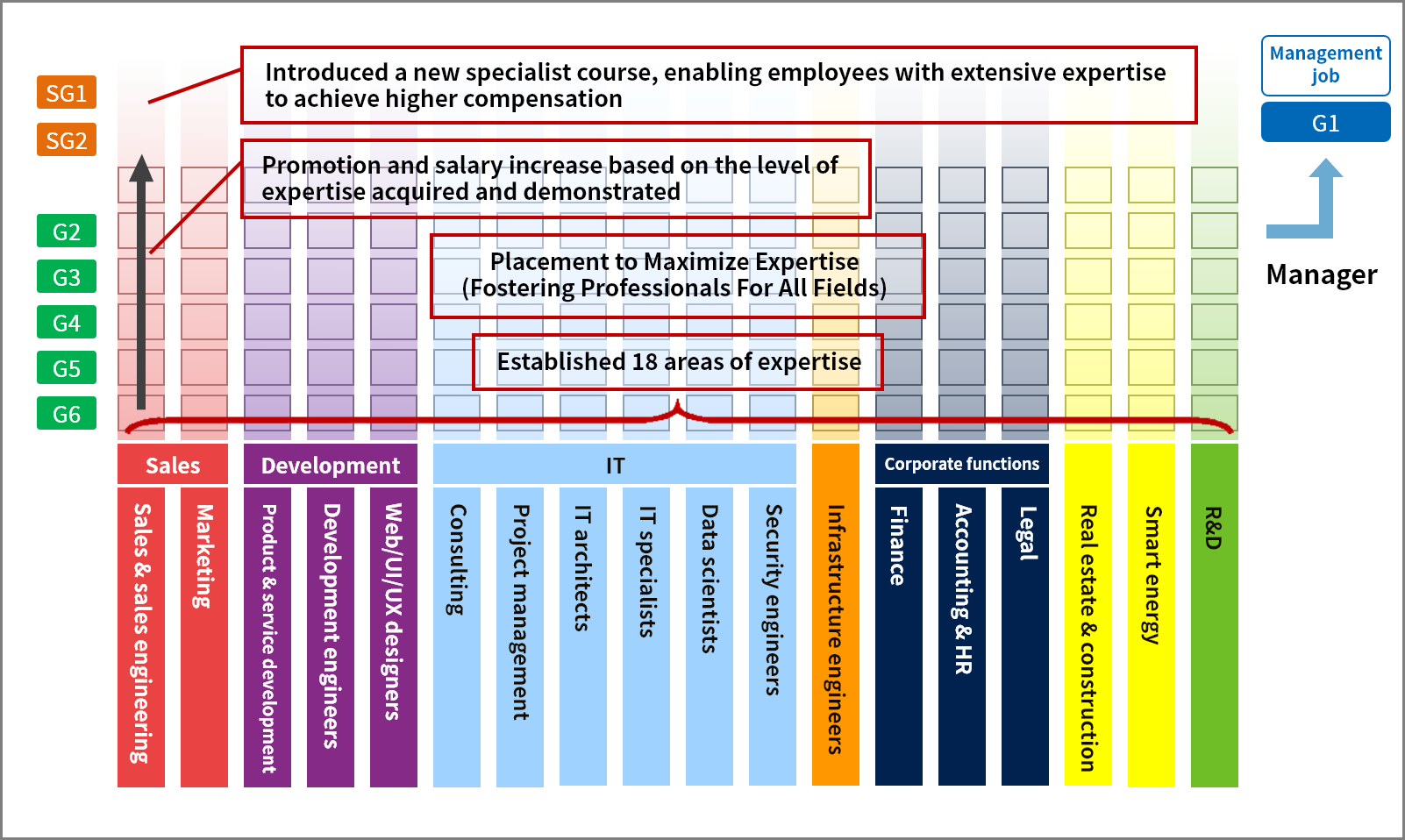Microsoft ends support for Internet Explorer on June 16, 2022.
We recommend using one of the browsers listed below.
- Microsoft Edge(Latest version)
- Mozilla Firefox(Latest version)
- Google Chrome(Latest version)
- Apple Safari(Latest version)
Please contact your browser provider for download and installation instructions.
Society
Autonomous Career Formation
Our Policy and Approach
Please see the following page:
Our business environment is changing rapidly. To respond flexibly to these changes, it will be critical for diverse human resources to demonstrate their abilities fully.
At the same time, it is essential to strengthen our organizational capabilities so that we can leverage individuals with extensive expertise and continue adapting to changes in the future.
Enhancing talent and organizational capabilities will bring about innovations, which in turn will offer new value to our customers and society.
We expect this will contribute to increasing the NTT Group's corporate value. Furthermore, we aim to create a virtuous cycle where employees work feeling excited about such outcomes, which lead to greater engagement.
Based on this view, we implemented various transformations in fiscal 2023.
At their core is autonomous career formation (career ownership). Through this scheme, employees will be able to grow their skills and strengths and choose organizations and jobs where they can make use of those abilities.
Moreover, it is crucial to create a more enabling work environment for such motivated employees. Through these continuous transformations, we will work to attain employees' self-realization and the Group's business growth.
Main Initiatives
Career Development Support System
System for Managers
To break away from annual and seniority-based systems and create and expand opportunities for employees to challenge themselves, we introduced a job-based personnel salary system for all managers in October 2021. This allows for flexible placement of the most suitable talent in roles and positions necessary for achieving our strategy, which will maximize our organizational performance.
The promotion rate of managers (the percentage of managers who were assigned at a rate exceeding previous promotion speeds during the July 2023 personnel transfers) was 18.8%.
We are steadily breaking away from annual and seniority-based systems and transitioning from placing the right person in the right job to finding the right job for the right person. We will continue our efforts to ensure that suitable talent is placed in roles and positions necessary for our business growth.
System for General Employees
To enable employees to pursue and achieve their career visions more autonomously, we have changed to a system that prioritizes the acquisition of expertise rather than years of service, age, or years of experience. Specifically, we have established 18 specialized areas attuned to external markets, as well as "grading standards" that clarify the required expertise and level of action for each area. In addition, based on these "grading standards," we have implemented an absolute evaluation system that allows high-performing employees to be duly recognized, abolished the minimum years of service required for promotions, and established a system in which employees are promoted and paid according to the degree of expertise they have acquired and demonstrated.
The promotion rate of general employees (the percentage of employees who were promoted at a rate exceeding previous speeds during the October 2023 promotion of general employees) was 10.0%, indicating an increase in employees undertaking autonomous career formation and challenges.
Moving forward, in every phase--from recruitment and development to placement--we will continue with operations that emphasize specialization, thereby facilitating the autonomous career development of our employees.
Helping Employees Develop their Abilities
In addition to Group training and on-the-job training to enable employees to gain necessary skills in various fields of business, we provide many other opportunities for employees who are eager to get ahead, including e-learning, distance learning, in-house certification of skill levels, and support for external qualifications.
We have also introduced a Group-wide talent management system to create an environment that enables employees to play a more active role in developing their careers, and we recommend training courses that would be effective in achieving their career goals.
Status of human resource development: Education (per employee)
*You can scroll horizontally
| FY 2019 | FY 2020 | FY 2021 | FY 2022 | FY 2023 | |
|---|---|---|---|---|---|
| Average annual training time (hours) | 30.0 | 24.0 | 34.0 | 38.0 | 40.7 |
| Average annual training cost (tens of thousands of yen) | 11.3 | 9.1 | 9.0 | 10.3 | 11.7 |
We actively support employee career development in various ways, including having superiors hold personal talks with their subordinates at the start, the middle and the end of the fiscal year to review performance and career plans, and holding management training for employees tapped for promotion.
In particular, we have created a curriculum for nurturing experts in the security field given the heightening security risks of recent years, and we offer leadership development and a personal network building training curriculums to around 400 carefully selected general managers and section managers.
With an eye on the further globalization of our operations, and to nurture personnel capable of performing in global markets, we also send employees to study at overseas graduate schools or participate in our overseas work experience programs.
Systematically Fostering the Next Generation of Management Personnel(NTT University)
Amid the ever-changing business environment, we operate NTT University as an initiative for fostering a diverse range of management personnel who possess broad perspectives and experience and are filled with the ambition to lead the world. In addition to the Next Executive Course (NEX) aimed at those striving to be promoted to executive officers within five years, in July 2023, we launched the Future Executive Course (FEX) aimed at potential future executives.
Applying meritocratic principles, we select personnel regardless of their years of service or age who are committed to becoming executives, and we support their growth as management-level personnel. Centered around difficult assignments that entail solving critical and challenging management issues, NTT University also provides a mentoring program that offers opportunities for learning and insights through dialogue with current executives, as well as external conferences, seminars, training, and other selective support programs.

CX Transformation Personnel Training Program
The NTT Group has positioned customer experience (CX)-related business as a potential growth area, and aims to intensify the training of personnel who can thoroughly understand issues from a user-centric perspective, and plan and implement CS solutions that create new brand experiences. To this end, we are implementing a personnel training program to promote CX business across the NTT Group.
This program focuses on the acquisition and enhancement of skills essential for CX business, including consulting skills such as listening, problem-solving, and hypothesis design, as well as user research skills, customer-centric CX service creation skills, and communication and execution skills for agile environments.
Performance in fiscal 2023: 39 employees at 13 companies (satisfaction 87%, willingness to apply skills 100%, recommendation rate 62%)
Business Activity
NTT DATA AcademiaExpanding Opportunities for Challenges
NTT Group Job Board (job posting system)
We created NTT Group Job Board, a system that supports voluntary employee transfers by allowing for ongoing recruitment and timely applications. In the year since July 1, 2023, approximately 1,000 employees applied for transfers, about six times more than through the old job posting system used until the previous fiscal year, indicating that more employees are challenging themselves at their initiative.

In-house Side Jobs (two jobs)
To foster skill development and independent career growth, we have introduced a system of side jobs (two jobs). This system allows employees to allocate a portion of their work hours to tasks in other departments while maintaining their responsibilities in their current roles. We will continue to promote an environment that fosters proactivity and self-growth for employees within the NTT Group.
Goal Management
Based on the organization's business plans and other guidelines, the NTT Group sets appropriate behaviors and performance levels for each qualification rank, and establishes goals for the year. Timely reviews are conducted if organizational goals require modification, or if focus areas need to be changed.
Goals are set based on the organization's business plan and are cascaded down from superiors. Specifically, supervisors clarify and explain their organization's business plan and their own personal goals, whereupon employees set their own goals based on them. In the case of managers, their specific job descriptions are also considered.
Supervisors conduct goal alignment discussions with employees in goal-setting interviews, and upon reaching agreement, approve the goals for the fiscal year.
Regular Personal Interviews with Superiors and Human Resources Managers
NTT Group employees meet regularly with their superiors and human resource managers for personal interviews to ensure that they share the same perception as their superiors regarding performance targets and the processes required to achieve them, to share thoughts on areas that can be improved, and to discuss career paths and personal growth.
Individual meetings with supervisors consist of one-on-one meetings held as part of daily process management as well as "goal-setting meetings," "mid-year meetings," and "review interviews." All serve as opportunities to check daily work progress and share and discuss work-related issues.
The goal-setting meetings are held to discuss goals for the current fiscal year and provide necessary advice.
The mid-year meetings are for examining the results of the fiscal year's first half and the degree of goal achievement and for discussing issues to be addressed in the second half.
And the review interviews are an opportunity for supervisors and their subordinates to review results, performance, and the processes for achieving targets, and for supervisors to provide advice and motivation for further improvements and growth.

The implementation of these interviews is managed so they are held without fail, except when vacations or leave prevent them from being held in the allotted time.
Skill Mapping and Encouraging and Supporting Acquisition of Qualifications
Each Group company sets up a unique program of skill mapping based on the characteristics of their respective business operations and conducts human resources training according to those categories.
Companies measure the level of each employee according to the mapping, identify the number of employees who are qualified for each level, and measure the status of implementation. Specifically, the process is operated as follows:
(1) Designate areas of expertise according to the expert skills required by each operation;
(2) Define and certify levels according to the skill set for each area of expertise; and
(3) Develop a PDCA cycle based on the employee's own career plan, supported by supervisors and the organization.
The NTT Group also encourages employees to acquire qualifications related to their respective duties, including major qualifications that are in broad demand in the ICT industry such as Professional Engineer, Information Technology Engineer and Certified Information Systems Security Technology Professional qualifications, and we intend to boost the number of qualified employees.

Appropriate Evaluation and Evaluator Training
Evaluations are determined in three stages: the primary evaluation, in which the superior (e.g., the section manager in charge) serves as the primary evaluator to determine the degree to which the employee achieved their work and demonstrated behaviors; the secondary evaluation, in which the general manager or other manager in charge serves as the secondary evaluator to confirm that the evaluation is appropriate in terms of actual performance and behaviors; and the evaluation finalization, in which the head of the organization confirms and provides approval regarding whether the results for all employees in the organization are consistent with the degree of achievement of the organization as a whole.
In this way, we work to prevent evaluation errors resulting from subjectivity or arbitrariness on the part of evaluators.
We provide employees in evaluator positions with evaluator training (e-learning) and new manager training as well as our Human Resources Evaluation Manual as part of our efforts to further improve the fairness of evaluations and employee satisfaction.
Employees being evaluated are trained on how to undergo evaluation and set targets, and receive a handbook explaining the evaluation and target-setting process, access to online educational tools to promote understanding of the HR and pay management systems, and a collection of high-performance model examples.
Fair Evaluation and Compensation
In our employee qualification system, the NTT Group puts priority on performance and sets behavior and performance targets tailored to each qualification rank. By steadily and accurately carrying out a series of evaluation processes that feedback evaluations based on these targets, our personnel system promotes autonomous and independent work by employees
Rather than having each company operate its own mechanisms for human resources management and development, we operate an all-inclusive system for managing employees' placement, building skills, evaluation, rating and payment, centered on an employee qualification system that indicates our expectations in terms of behavior and performance according to the employee level. (Evaluation system applies to 60% of the NTT Group.)
To ensure that each business is developed smoothly, it is important to place the right personnel in the right places so that every employee can display their fullest potential.
Therefore, we periodically rotate personnel on the basis of each employee's overall skill development and career plan decisions.
Multifaceted Evaluation
In each Group company, as part of management training, a 360-degree multifaceted evaluation is implemented for managers, involving the individual, their superiors, peers, and team members.
In this evaluation system, a multifaceted assessment is conducted of key managerial qualities such as visioning, coaching, and leadership, and the results are communicated to the individual. In addition to quantitative scores, qualitative feedback is required that identifies strengths to enhance and weaknesses to improve. This approach helps managers to recognize the discrepancy between their own self-evaluation and external evaluations, encourages them to be aware of the attitudes and behavior expected of them, and promotes improvements in their awareness and behavior.
Evaluation of the Organizations
At the NTT Group, we have set employee engagement as a key indicator for the sustainability KPIs in order to improve engagement across the company. Efforts are made within each organizational unit to elevate employee engagement (measured by the proportion of positive responses) compared to a base year at key companies.
Moreover, to ensure strong organizational commitment to employee engagement, we have incorporated it as an indicator for executive compensation, and also set it as a criterion for the performance bonuses of all management staff.
Society
NTT STORY
WEB media that thinks about the future with NTT










